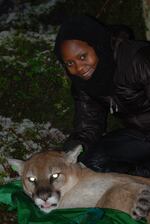Growing up on a farm in the rural hills of Uganda, Carol Bogezi knew that fending off predators was critical to her family’s survival.
They used bows and arrows to keep monkeys from eating their vegetables and wild cats from harassing their goats. But beyond the predator-prey dynamics, there were complicated human dynamics to deal with, as well. Her father had three wives and 17 children so Carol often sought peace and quiet out in the fields where she'd watch antelope frolic and study the different types of plants and grasses.
"Seeing all this life going by, it was exciting," Bogazi said. "I think it instilled something: there is life happening and it's happening on our farm and it's something that I cherished."

Carol Bogezi with a cougar that was sedated in the Marckworth State Forest east of Duvall, Jan 2013.
Dr. Brian Kertson
Bogezi never lost that sense of wonder. She went on to work for the Wildlife Conservation Society in Uganda. And now she is pursuing a doctoral degree in wildlife science at the University of Washington. Her research focuses on the relationship between carnivores and people and how it can be improved. On Monday, the Bullitt Foundation of Seattle announced that Bogezi will be awarded a $100,000 fellowship to continue her research.
Bogezi does not shy away from difficult situations. She was 22 when her parents died, within six months of one another. Bogezi balanced her schoolwork with running the family farm and put her younger siblings through boarding school. As a PhD student, Bogezi homed in on one of the most controversial environmental issues in the Northwest: the relationship between wolves and humans.
She interviewed close to 50 ranchers and was surprised at the "anger" and "wrath" that she heard.
"I was expecting that everyone understood how important wildlife and natural resources are. I thought everyone trusted the government and the good constitution that puts property there. Honestly I had responses that I was really, really shocked by."
Some ranchers talked about how expensive it is to protect livestock from wolves and how they don't want more regulations or outsiders telling them what to do. Others said they didn't trust their government and thought wolf reintroduction was a conspiracy to take away their land.
"People perceived wolves as useless or a nuisance. I was like, 'I would hear exactly that, in just a different language... from a herder in Uganda.'"
Bogezi found common ground with her interviewees by presenting herself as someone who knew nothing about the history of the wolf issue in the West, but shared a farming background and knew what it meant to lose livestock to predators.
"Understanding the human dimensions of what people actually perceive has been very eye-opening for me to do that sort of work," Bogezi said.
Now, Bogezi plans to use the prize money from the Bullitt Foundation to come up with ways to make it easier for people and predators to live together. For example, she wants to talk to more ranchers about getting a special certification on their meat products. It would tell consumers that the ranch where this meat came from is working to protect wolves — sort of like "dolphin-safe" tuna fish. And ranchers can then charge more for their wolf-friendly product.
Carol Bogezi is working on finishing her PhD now but she says eventually she'll go back to Uganda to help improve the way people interact with predators in her home country.
